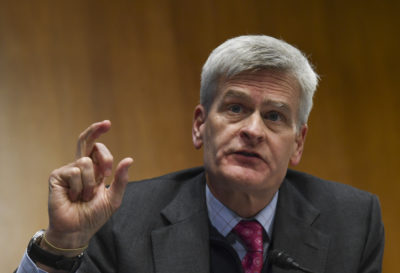
Sen. Bill Cassidy advocating for mental health reforms
(12-19-22) I got to know Sen. Bill Cassidy (R. La.) in 2016 when he joined with Sen. Chris Murphy (D. Conn.) in passing the most significant mental health legislation in decades – the Mental Health Reform Act.
Because of his work on that crucial bill, I knew he cared deeply about improving our mental health care system. I became more convinced after he invited me to Louisiana to deliver a keynote speech during a one day mental health care summit. We were able to have dinner together that night.
What I didn’t know was that his passion comes from a deeply personal loss. He became emotional during a recent interview with CNN and shared his story when asked about how mental illnesses impact families.
Sen. Cassidy is scheduled to take charge in January of ranking member of the influential Health, Education, Labor, and Pensions Committee. In that position, he and Sen. Murphy are hoping to push for passage of the Mental Health Reform Reauthorization Act of 2022, which will continue funding for many of the programs implemented in the 2016 act.
I’ve often noticed that elected officials who get involved in mental health have personal stories that made them painfully aware of the need for reforms.
Bravo, Sen. Cassidy for sharing your story.
Senate Republican chokes up as he talks about how mental illness impacted his family
CNN – A Republican senator became emotional as he spoke in deeply personal terms about the importance of mental health care in America.
Sen. Bill Cassidy of Louisiana, who is slated to take over in January as ranking member of the influential Health, Education, Labor, and Pensions Committee, told CNN’s Pamela Brown, “every single one of us has a family history. A loved one, a friend, someone you know, that has serious mental illness.”
For Cassidy, the issue is personal. His nephew died by suicide decades ago, and the Louisiana senator is “still emotional after all these years. But everybody has such an emotional story.”
A licensed physician, Cassidy previously worked in hospitals for the uninsured. He stressed the importance of treating mental and physical health in tandem, noting that “having serious mental illness often leads to serious physical illness.”
Last year, the US saw 14 suicide deaths for every 100,000 people, according to data from the US Centers for Disease Control and Prevention. Worldwide, nearly 800,000 people die from suicide yearly, and in 2020, there were 1.2 million attempts globally.
The death of Cassidy’s nephew, coupled with his work with vulnerable populations as a doctor, has made mental health one of his top legislative priorities.
“We have this emotion, and there’s nothing to do about it. Or, we can say we’re going to attempt to do something about it,” he told CNN.
In May, Cassidy, alongside Democratic Sen. Chris Murphy, introduced legislation to expand and improve upon a bipartisan mental health measure that had expired in September.
“Whether or not it’s passed, at the end of the year, I can’t tell you that,” Cassidy told CNN. “If not, we will reauthorize it again this coming year.”
As ranking member, Cassidy will work alongside the committee’s chairman, progressive Vermont Sen. Bernie Sanders.
When asked how the pair will find common ground, Cassidy told CNN that while he may disagree with Sanders on the “prescription” for various healthcare issues, they likely will agree on the “diagnosis.”
“If it is something which is good for the United States of America, I will work to that solution,” Cassidy said.
Editor’s Note: If you or someone you know is struggling with suicidal thoughts or mental health matters, please call the Suicide & Crisis Lifeline at 988 or 800-273-8255 to connect with a trained counselor, or visit 988lifeline.org.




